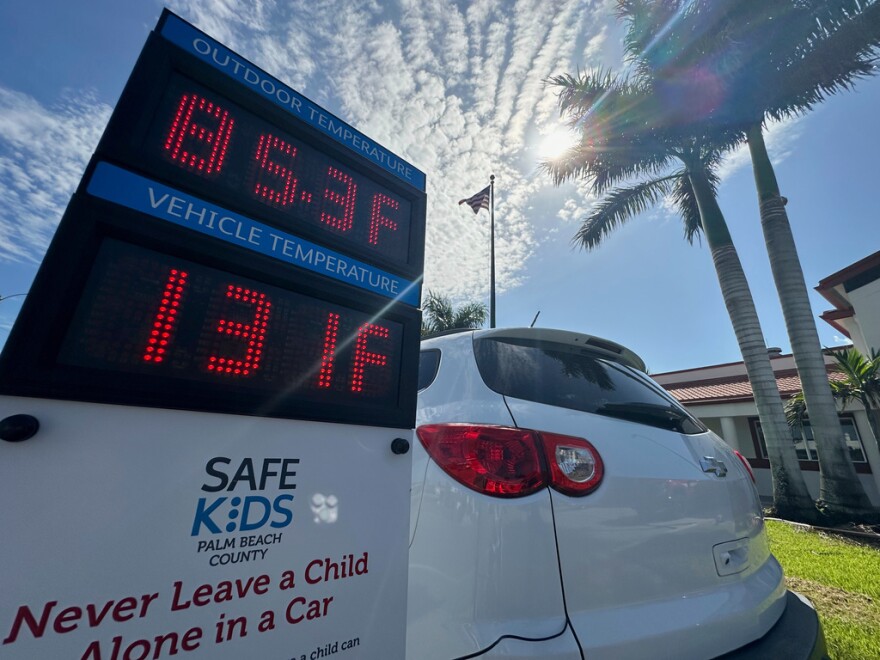A record heat wave that spread across the East Coast during the first week of summer has child advocates warning parents and caretakers about the risks of heatstroke to children left inside hot vehicles.
So far this year, 11 children have died after being left unattended in vehicles in Florida, California, Louisiana, Maryland, New Mexico, New Jersey and North Carolina, according to Kids and Car Safety, which collects data on hot car deaths. Seven died in June, including two over the weekend in Texas.
And last year, 39 children in the U.S. died after being left in hot cars.
Why hot cars are so dangerous for children
Climate change keeps dialing up temperatures and extreme weather, scientists say. But the temperature outside doesn't have to be super hot for a child left in a vehicle to be affected by the heat, said Kathy Wall, director of Safe Kids Palm Beach County.
“Inside, the vehicle can heat up 20 degrees in just 20 minutes,” Wall said. “So if you imagine it’s an 80-degree day, which in South Florida is a cool day, it could be over 100 degrees within 10 minutes inside the car."
Hot car deaths can happen any time of year, and since 1998, every state but Alaska has reported a one, according to the National Safety Council. In 2018 and 2019, a record 53 children died after being left in hot cars.
About 80% of the heat rise in vehicles happens in the first 30 minutes of a child being left inside, when maximum temperatures can exceed 150 degrees, according to data compiled by Jan Null, a certified consulting meteorologist at San Jose State University.
“Children sweat a lot less than adults do, and their internal temperature can increase three to five times faster than an adult. So that’s why it’s just as important to make sure that your child isn’t left in the vehicle, especially during these rising temperatures," said Capt. Karen Derogatis of Palm Beach County Fire Rescue.
It can happen to anyone
While it’s easy to place blame for leaving a child in a vehicle, even people trained to know the dangers have made that tragic mistake, Wall said.
“It’s not a socioeconomic group; it’s not a cultural group,” she said. “This sadly has happened to doctors; it’s happened to dentists; it happened to school teachers; it’s happened to child care workers. Nobody is exempt from this.”
Distraction often leads to forgetting about a child in the backseat, which is why it is important to create routines and reminders, she said.
“It sounds crazy, but sometimes people get out of routines or are distracted, especially in today’s world. There’s lots going on in the news, lots going with families,” she said.
A parent who normally doesn't drop a child off at a day care facility might become distracted and forget that the child is in the vehicle, she said.
Create a reminder that a child is in the backseat
She encourages parents and caregivers to establish routines.
“We have an acronym: ACT," Wall said.
The A stands for avoiding leaving a child unattended in a vehicle.
The C stands for creating a reminder that works best for you. Authorities suggest leaving a personal item such as a purse or briefcase in the backseat so you'll have to open the back door before locking the vehicle.
The T means to take action right away.
“If you see a child in a car, don’t try to figure out how long they’ve been in the car. Call 911 immediately," Wall said.
Some newer cars offer warnings for drivers to check the backseat for passengers.
Double-checking the vehicle is key, said Derogatis, the fire captain.
"If you make it a common habit, just like you would look in their rear view mirror to see if somebody’s behind you, or if you look at your side view mirror to see if you want to switch lanes, make it habit to look in your rearview mirror, whether you have a child or an animal or anything, just to ensure that they are as safe as possible,” she said.
Father arrested in Florida child's death
In the Florida case, an Ormand Beach father was arrested after leaving his 18-month-old son "helpless in a hot truck" for more than three hours the afternoon of June 6, authorities said.
The outside temperature reached 92 degrees that afternoon, and officials estimated the truck's cabin temperature reached 111 degrees.
Scott Allen Gardner, 33, faces charges of aggravated manslaughter of a child and child neglect causing great bodily harm.
According to the Volusia County Sheriff's Office and Ormand Beach Police Department, Gardner left the child, Sebastian, in the locked vehicle while he got a haircut at 11:30 a.m. and went drinking at a lounge across the street around noon.
Police said Gardner discovered his son wasn’t breathing when driving around 2:30 p.m. After he called 911, police arrived at 2:49 p.m., but the toddler was already dead, Chitwood said.
The child's body temperature was measured at over 107 degrees after he was rushed to a hospital, officials said.



